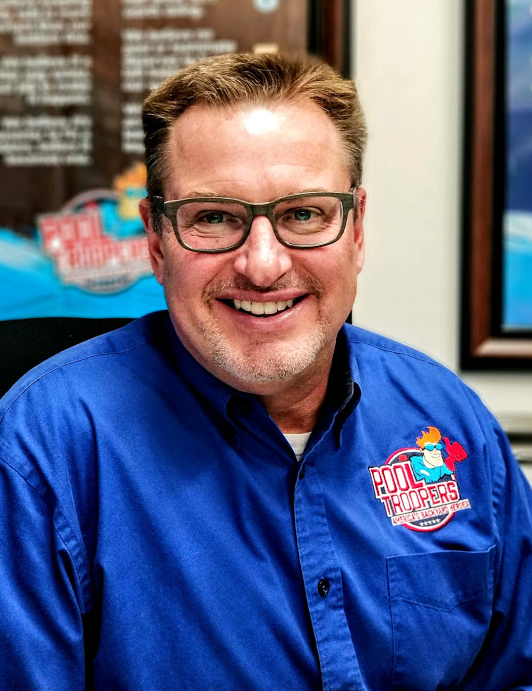Though the roll-up, aggregate or consolidation model is relatively new to the industry, the same cannot be said for either Gary Crayton or his ambitions to go national.
It is only recently that his company took on a private equity partner and began to expand through acquisition, however it’s something he’s wanted to do for decades.
Crayton has been with Pool Troopers since his father, also Gary, purchased it in the 1970s. At the time, it was called Chittenden Pool Supply and worked in construction, retail and service. The elder Crayton quickly renamed it Bay Area Pool Service. It would become Pool Troopers decades down the line.
As a youngster, the younger Crayton would work there during summers. After graduating from Wake Forest University with a degree in finance and accounting, then working in the banking industry for a couple years, he joined his father’s company full-time.
Upon viewing the firm from the perspective of a banker, something became clear very fast:
“I looked at the financial statements and said, ‘Wow! We’re spending 95% of our time on pool construction and spas, but we’re making very little money doing that. And we’re spending 5% or less of our time on this service division, while all the profit that the business is generating is coming out of there.”
He convinced his father to dedicate one year to trying to make proper margins from construction. If it didn’t pan out, they agreed, the company would tighten its focus on service.
The market wasn’t friendly to their brand of construction, which involved such premium features as dual main drains, which were virtually unheard of back then. So they couldn’t reach their profit targets. Gradually, the younger Crayton closed the retail and construction divisions.
From the beginning, he hoped to take the company national. “I really thought our industry should have a national player,” Crayton says. “I thought we’d be much better off if we had a leader on the national side that could represent the service side within our industry.”
In the late 1990s, he wanted to explore private equity. It wasn’t the right time, so the company didn’t move forward with the national plans. In the end, he believes it was probably a good thing.
“That was the infancy of the private equity boom. It was a much different world back then,” Crayton says. “I’m not sure we would have been treated well. You’ve heard the term leveraged buyouts: Do everything with a lot of leverage, don’t put any equity in, juice your returns by doing nothing but throwing debt on the businesses. That wouldn’t have been a pretty picture in the pool service world, because we don’t have a lot of assets to attach leverage to and throw a bunch of debt on with any kind of success. If there were any kind of downturn, we would have gotten crushed.”
Private equity firms have evolved since then to become more suitable for the industry. While some old-school players still exist, modern private-equity companies are more willing to invest in their portfolio companies.
“They want to actually create value by creating a spectacular organization that’s going to succeed in the future, and not just while they hold it,” Crayton says. “So they’re much more long-term-thinking, much more mature.”
By 2009, Crayton owned the company. He created the Pool Troopers brand, which was applied to newly opened locations. Growing organically, it expanded in nine markets occupying three states before it sold to private equity firm The Shoreline Group.
Now the company has 16 locations in five states — South Carolina, Georgia, Texas and Arizona, in addition to its original home of Florida.
Crayton’s Outlook
Q: What effect do you expect business models such as yours to have on the overall service industry?
A: I really love this industry, but I’m often disappointed in the way our industry looks at the service segment. I don’t feel we’re properly represented at the table. There’s just a lack of focus on the service side, and there’s not a national voice … I believe we have to provide that, and I want to accomplish that before I’m done.
I’m also hoping the overall quality goes up. As the tide rises, all boats rise — whether it’s us or other [national] brands. As clients come to expect a certain level of service that they can expect from a strong national brand, I would expect that that would raise their minimum level expectations and that other businesses would have to rise to that.
Q: Do you expect smaller companies to still have a place in the long run?
A: Even if our company gets 150,000 pools, there are 12 million pools out there — we’re a drop in the bucket. And hundreds of thousands are being built every year. So there’s always going to be a place for the individual entrepreneur who wants to do what we do. Some manufacturers in our industry have done a pretty decent job putting out software programs and other business tools that help perform services like providing pictures to clients when they finish services. The level of service in our industry is going up, the level of education is going up, the understanding of chemistry is going up. I just feel that as an industry we’re going to get a lot better.
Crayton’s Takes
Single biggest accomplishment of his career: Tapping individuals who were pool technicians a year or two ago and saying that you believe in them to the point that they can become a branch manager and giving them those opportunities beyond which they ever expected that their life would take them to and seeing them flourish. It’s been spectacular to watch people rise to that challenge.
Motto or favorite saying: We have a little family saying, “We’re Craytons and we finish strong.”
Most important thing to maintain focus and energy: I try not to take work home, ever. We work hard when we’re here, and then I like to not work when I’m home. When you work at home, or talk about work with family, it just makes your downtime not your down time, so you never recharge the batteries. And I think it’s so important to recharge the batteries, so to speak. It’s hard not to think about work sometimes but, to the extent that you can control it and not bring work home with you everyday, that’s something I feel is important.
Favorite business book: Extreme Ownership: How US Navy SEALs Lead and Win. I listen to it on tape all the time. It’s an awesome business book, and just listening to those individuals who gave so much to our country and how they think about leadership has been a real eye opener for me.
Personal role model and the single most important thing they taught: I’m lucky. My business partner, Dave Hahmann, is a friend and a mentor. He’s a great business partner. We’re not the same — what he excels at, I don’t; what I excel at he doesn’t. So we complement each other really well. None of this is possible without him.


